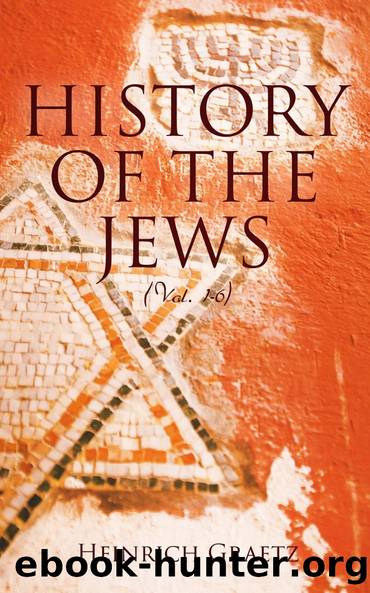History of the Jews, Vol. 2 (of 6) by Heinrich Graetz

Author:Heinrich Graetz [Graetz, Heinrich]
Language: eng
Format: epub
Tags: Middle East, Classics, Fiction, Nonfiction, History, Jewish, Israel
ISBN: 4064066383954
Google: qe4jEAAAQBAJ
Publisher: e-artnow
Published: 2021-04-27T04:00:00+00:00
* * *
CHAPTER XIV.
INNER LIFE.
Inner Life of the JewsâSphere of Action of the Synhedrion and the PatriarchâThe Order of Members and Moral Condition of the Common PeopleâRelation of Christianity towards JudaismâSectsâJewish ChristiansâPagan ChristiansâEbionitesâNazarenesâThe GnosticsâRegulations of the Synhedrion against ChristianityâProselytes at RomeâAquilas and his translation of the BibleâBerenice and TitusâDomitianâJosephus and the Romans.
The Synhedrion of Jamnia had become the heart of the Jewish nation, whence life and activity streamed forth to the most distant communities. Thence proceeded all arrangements and decisions relating to religious matters, which were to become popular, and the observance of which was to be ensured. The nation regarded the Synhedrion as a remnant of the State, and paid to the Nasi (the President), a member of the house of Hillel and a descendant of David, an amount of reverence such as might be shown to royalty. The Greek title Ethnarch, which means Ruler of the People, and which approaches nearest to the description of a king, seems to show that with the Patriarchate was associated the princely dignity. Therefore the people were proud of the house of Hillel, because through its members the ruling power remained in the house of David, and thus the prediction of the patriarch Jacob was verified, "that the scepter should not depart from the tribe of Judah." After the Patriarch came his representative Ab-beth-din, and the Chacham (the Wise), whose special office is not known. The Patriarch had the right of appointing judges and the officers of the congregation, and probably supervised their actions. The Roman government had not yet interfered with the communal arrangements of the Jews so far as to cause the judicial offices to be performed by Romans. The authority of the Patriarch left the power of the teacher, however, undiminished in certain of the schools; they could confer on their disciples the dignities of judge or teacher of the people, and the assent of the Patriarch was not required. The master laid his hand on the head of the pupil, and this ordination was called Semicha, or Minui, and meant Nomination, Ordination, or Promotion. The ordained bore the title Zaken (Elder), which was almost equivalent to that of Senator, for through this ordination they obtained the right of membership of the Council when the choice should fall on them.
The chief activity of the Patriarch was felt at the public meetings of the Synhedrion. He occupied the highest place, supported by the chief members who were seated around in a half-circle. Behind these members, whose number at this time was probably seventy, there were several rows of the ordained, behind whom stood the pupils, and at the back the people seated on the ground witnessed the proceedings.
The Patriarch opened the meeting either by introducing some subject of discussion from the Laws, or by inviting the members to speak by the formula "Ask." If he himself spoke first, he uttered some sentences softly to the Meturgeman, who then developed and explained them in an oratorical manner. Any person had the
Download
This site does not store any files on its server. We only index and link to content provided by other sites. Please contact the content providers to delete copyright contents if any and email us, we'll remove relevant links or contents immediately.
History of the Jews, Vol. 2 (of 6) by Heinrich Graetz(73)
History of the Jews, Vol. 1 (of 6) by Heinrich Graetz(54)
History of the Jews, Vol. 4 (of 6) by Heinrich Graetz(51)
Feeding the Five Thousand by Aus Roger David;(49)
Nelson, Cary - Israel Denial Anti-Zionism, Anti-Semitism, the Faculty Campaign Against the Jewish State by Indiana University Press (2019)(42)
Great tales of Jewish occult and fantasy : the Dybbuk and 30 other classic stories by Unknown(29)
Sketches of Jewish Social Life by Alfred Edersheim(28)
Judaism and the Challenges of Modern Life by Moshe Halbertal; Donniel Hartman(27)
Elias Bickerman as a Historian of the Jews by Baumgarten(21)
